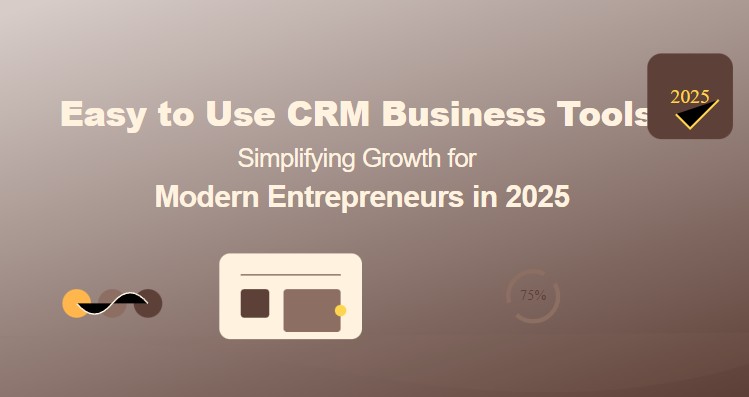In today’s hyper-connected marketplace, running a business without a CRM is like flying blind. But what if you’re not a tech expert or don’t have time to train your team on a complex system? The solution lies in easy to use CRM business tools—platforms built for simplicity, efficiency, and scalability.
Whether you’re a freelancer, a local business owner, or a startup founder, the right CRM can be your digital brain—organizing leads, automating follow-ups, managing tasks, and improving customer experiences.
This guide will walk you through:
-
🔹 What makes a CRM tool “easy to use”
-
🔹 Key features to look for
-
🔹 Top user-friendly CRM tools in 2025
-
🔹 Integration tips and use cases
-
🔹 Success stories from small businesses
-
🔹 Final advice for choosing the right tool
Let’s break down complexity and bring clarity to CRM adoption 🚀
Table of Contents
🧠 What Are CRM Business Tools?
CRM stands for Customer Relationship Management—but modern CRM tools do so much more. They combine sales, marketing, and service functions into a single, streamlined interface.
A CRM business tool helps you:
-
Organize customer information
-
Track interactions and sales pipelines
-
Automate communications (email, SMS, task reminders)
-
Generate insights with real-time analytics
-
Centralize team collaboration
When CRM tools are easy to use, they remove the need for IT specialists, consultants, or endless hours of onboarding.
🤖 What Makes a CRM Tool “Easy to Use”?
Not every CRM is built with simplicity in mind. Some require heavy technical configuration, while others offer just enough power in a sleek, beginner-friendly format.
Here are six key attributes of an easy-to-use CRM:
| Feature | Why It Matters |
|---|---|
| 🧭 Intuitive User Interface | Saves time, reduces training cost |
| ⚙️ Fast Setup & Onboarding | Can be implemented in under an hour |
| 📱 Mobile-Optimized | Lets you manage contacts, leads, and tasks on the go |
| 🔌 Seamless Integrations | Works with Gmail, Outlook, Zoom, Slack, etc. |
| 🔁 Built-in Automation | Removes manual task burden for small teams |
| 📊 Visual Dashboards | Makes performance tracking clear and actionable |
🧰 Key Features to Look for in CRM Business Tools
Small business owners don’t need enterprise-grade complexity. They need tools that cover their day-to-day operations efficiently.
1. Contact Management
Keep track of every customer, lead, and supplier in one dashboard.
2. Sales Pipeline Tracking
See at a glance where each deal stands and what action is needed next.
3. Task & Reminder Automation
Never forget a follow-up again—schedule and auto-trigger tasks.
4. Email Integration
Send, track, and automate emails directly from your CRM.
5. Custom Fields & Tags
Organize your contacts by status, location, product interest, or lead source.
6. Mobile App
Let your team (or you) update CRM entries on the fly from anywhere.
7. Lead Capture Forms
Collect website visitors and funnel them directly into your CRM.
🏆 Top 6 Easy to Use CRM Business Tools in 2025
After evaluating usability, features, pricing, and user feedback, here are the top tools for small businesses this year:
1. HubSpot CRM (Free Plan)
Why it’s user-friendly:
-
Clean, modern UI with drag-and-drop pipelines
-
Works with Gmail, Outlook, Slack
-
100% free version with no expiration
-
Built-in live chat, forms, deal tracking
Perfect for: Solopreneurs, agencies, service businesses
💰 Pricing: Free (paid add-ons from $20/month)
2. Zoho Bigin
Why it’s user-friendly:
-
Designed specifically for small and micro businesses
-
Mobile app is excellent
-
Visual pipeline management
-
Call logging and email tracking included
Perfect for: Local businesses, freelancers
💰 Pricing: From $7/month
3. Monday Sales CRM
Why it’s user-friendly:
-
Combines CRM + project management
-
Pre-made workflow templates
-
Color-coded boards and custom views
-
Automated task assignments
Perfect for: Creative agencies, consultants, client-service firms
💰 Pricing: From $10/month
4. Freshsales by Freshworks
Why it’s user-friendly:
-
Built-in AI assistant (“Freddy”)
-
Lead scoring + email campaigns
-
Visual deal tracking
-
Quick setup and smart interface
Perfect for: Tech startups, digital marketers
💰 Pricing: Free tier available, paid starts at $15/month
5. Pipedrive
Why it’s user-friendly:
-
Designed around visual sales pipelines
-
Sales-first design with mobile CRM functionality
-
Simple lead automation
-
Reporting is beginner-friendly
Perfect for: Small sales teams or B2B companies
💰 Pricing: From $14.90/month
6. Capsule CRM
Why it’s user-friendly:
-
Lightweight CRM with simple UI
-
Contact management + opportunity tracking
-
Google Workspace and Outlook integrations
-
Tagging, task setting, calendar sync
Perfect for: Accountants, lawyers, consultants
💰 Pricing: Free tier available, paid from $18/month
📊 Quick Comparison Table
| CRM Tool | Free Plan | Mobile App | Automation | Integrations | Visual Pipelines |
|---|---|---|---|---|---|
| HubSpot CRM | ✅ | ✅ | ✅ | ✅ | ✅ |
| Zoho Bigin | ✅ | ✅ | ✅ | ✅ | ✅ |
| Monday CRM | ✅ | ✅ | ✅ | ✅ | ✅ |
| Freshsales | ✅ | ✅ | ✅ | ✅ | ✅ |
| Pipedrive | ❌ (Trial) | ✅ | ✅ | ✅ | ✅ |
| Capsule CRM | ✅ | ✅ | Limited | ✅ | ✅ |
🔁 CRM Integration Examples for Small Businesses
🛒 E-commerce (Shopify + CRM)
Automatically add customers who abandoned cart to your CRM for follow-up.
📞 Service Providers (Calendly + CRM)
Every booked appointment becomes a new lead with reminder tasks.
💼 B2B (LinkedIn + CRM)
Log new leads from LinkedIn messaging directly into CRM via Zapier.
📨 Email Marketing (Mailchimp + CRM)
Trigger email sequences from CRM tags (e.g., “VIP customer”).
📈 Real Use Case: How a Boutique Agency Doubled Their Close Rate
Company: Lumen Studio – a 3-person design agency
Problem: Lost leads, no follow-ups, cluttered inboxes
Solution: Implemented Monday Sales CRM with automation + Slack integration
Result:
-
Follow-up rate increased 300%
-
Closed 2x more deals in Q2
-
Created a dashboard to forecast monthly income in real-time
Owner’s Quote:
“We didn’t need a full-blown Salesforce setup. Monday’s CRM let us move fast without a tech team.”
✅ Final Advice: Choosing the Right CRM Business Tool
1. Keep It Simple First
If it feels like work just to get started, it’s not the right fit.
2. Prioritize What You Need Now
Don’t overpay for features you won’t use for 6 months.
3. Test Multiple Platforms
Most tools offer 7–30 day trials. Use them to compare UIs and usability.
4. Check for Mobile App Quality
CRM must travel with you in your pocket—especially for field workers, sales reps, or consultants.
5. Ask: Can This Save Me Time Weekly?
A great CRM should automate at least 2–5 hours of work per week.
🎯 Final Thoughts: CRM Should Be Your Easiest Employee
An easy-to-use CRM tool isn’t just software — it’s like hiring your first virtual assistant. It tracks, remembers, nudges, and reports — so you don’t have to.
As businesses compete not just on product, but on customer experience, the right CRM empowers you to deliver more personalized, professional service — without stress.
Start simple. Scale smart. Let your CRM do the heavy lifting while you focus on doing what you love.




